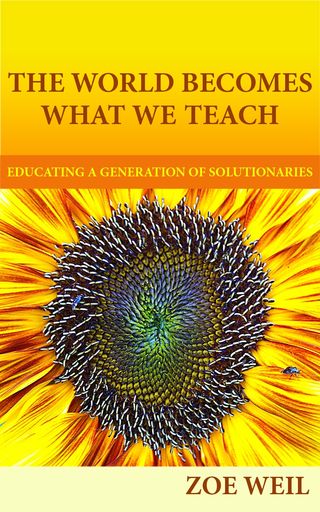Education
The World Becomes What We Teach: Humane Education Is Key
A new book by humane educator Zoe Weil should be required reading for everyone.
Posted March 18, 2016
World-renowned humane educator and author par excellence, Zoe Weil, co-founder and president of the Institute for Humane Education (IHE), has written yet another book that should be required reading for all educators. Her latest gem is called The World Becomes What We Teach: Educating a Generation of Solutionaries (the Kindle edition can be found here). The book's description nicely outlines what this book is all about, and I had the great fortune to do an interview with Zoe as well.

The description reads: "How can we create a just, healthy, and humane world? What is the path to developing sustainable energy, food, transportation, production, construction, and other systems? What’s the best strategy to end poverty and ensure that everyone has equal rights? How can we slow the rate of extinction and restore ecosystems? How can we learn to resolve conflicts without violence and treat other people and nonhuman animals with respect and compassion?
The answer to all these questions lies with one underlying system―schooling. To create a more sustainable, equitable, and peaceful world, we must reimagine education and prepare a generation to be solutionaries―young people with the knowledge, tools, and motivation to create a better future. This book describes how we can (and must) transform education and teaching; create such a generation; and build such a future."
My interview is as follows:
Why did you write The world becomes what we teach?
I believe that schooling is the root system underlying all other systems, and if we transform education, specifically by 1) adopting a more relevant purpose for schooling - to educate young people to be solutionaries ready and able to solve problems in ways that are good for people, animals and the environment, 2) make schools real-world and solutionary-focused, and 3) prepare teachers to educate their students to be solutionaries, we will witness the rapid unfolding of a more just, healthy, and humane world. I wrote this book as a short manifesto with the vision and practical ideas for doing this so that young people will be provided with the skills to be critical, creative, and systems thinkers who care about the grave challenges in the world and are prepared to solve them.
What are you major messages?
• A just, peaceful, and humane world is possible
• By transforming our educational system, making schools real-world and solutionary-focused, and preparing teachers for their important roles in this endeavor we can ensure meaningful solutions to problems that don’t harm one group while helping another
Your call for reimagining the classroom seem to fall in line with my own about 'rewilding education and the classroom.' Why is this so important?
There are so many issues in education today and so many reforms, yet almost all fall short. It isn’t just that we have achievement gaps or that our students don’t do as well on international tests that measure proficiencies; it’s that we haven’t adapted education to the needs of our time. Our children need to grow up to be able to be astute and excellent researchers; deep and proficient thinkers; caring and concerned citizens, and - most importantly - successful agents of positive change. Given the problems we face in the world, unless children are educated to be engaged and enthusiastic solutionaries - people able to identify unsustainable, unjust, and inhumane systems and transform them - they will face a bleaker future in which half of all species may disappear, rainforests, coral reefs and glaciers may continue to decline, and growing human population coupled with inequity and lack of access to essential resources may create more conflict.
Why do you remain hopeful?
I’m hopeful because I know it’s possible to solve our challenges, and I’m in awe of the young people who - when they receive this kind of education - do brilliant work doing so. I’m hopeful because, as Martin Luther King Jr. said, “the arc of the moral universe is long but it bends toward justice” and we see this happening every year. I’m hopeful because there is less violence and discrimination in the world now that there used to be and more rights are respected, both human and animal rights. We have such a long way to go, but there’s no doubt in my mind that we can get there. Will we? That depends so much on our education system, which is why I’m so dedicated to changing it.
Any other things you'd like to say?
Thank you Marc! For all you do and all your support!!!
Thank you! My suggestion is to read this book again and again, share it widely with everyone you know especially with teachers at all levels, and keep in your mind and heart that indeed, the world becomes what we teach. These six words surely can become a game changer as we head on in the anthropocene, the age of humanity. We owe it to future generations to do the very best we can. There is no other way.
Note: You can sign up for IHE's Thunderclap campaign here.
Marc Bekoff's latest books are Jasper's Story: Saving Moon Bears (with Jill Robinson), Ignoring Nature No More: The Case for Compassionate Conservation, Why Dogs Hump and Bees Get Depressed: The Fascinating Science of Animal Intelligence, Emotions, Friendship, and Conservation, Rewilding Our Hearts: Building Pathways of Compassion and Coexistence, and The Jane Effect: Celebrating Jane Goodall (edited with Dale Peterson). (Homepage: marcbekoff.com; @MarcBekoff)


